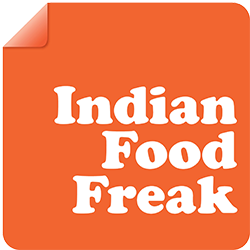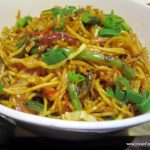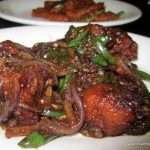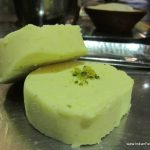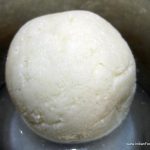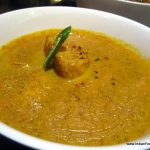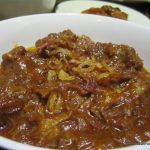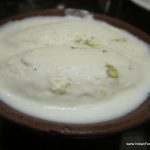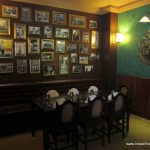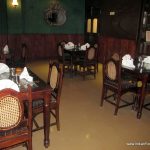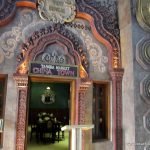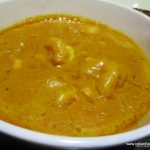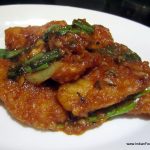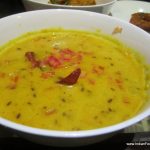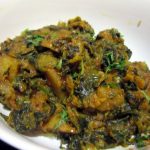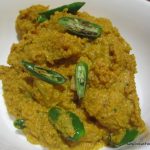 It’s been long since I have been on the lookout for good, authentic, Bengali fare, and I am glad to say that I have found it. Tucked away in the unlikeliest of places, in the throbbing mela surroundings of Culture Gully, Kingdom of Dreams, is a small restaurant with a board proclaiming Chinese food only as it is cooked in Tangra, along with Bengali delicacies.
It’s been long since I have been on the lookout for good, authentic, Bengali fare, and I am glad to say that I have found it. Tucked away in the unlikeliest of places, in the throbbing mela surroundings of Culture Gully, Kingdom of Dreams, is a small restaurant with a board proclaiming Chinese food only as it is cooked in Tangra, along with Bengali delicacies.
 I am here at the invitation of Kingdom of Dreams to sample the food at this restaurant. The restaurant has muted classical interiors with many photos from Kolkata to build the mood. I am greeted by their sous chef Karan Bansal along with their F&B manager Ashish Mahato, who informs me that the food here is cooked by chefs from Bengal and Tangra. I decide to start with the Tangra cuisine.
I am here at the invitation of Kingdom of Dreams to sample the food at this restaurant. The restaurant has muted classical interiors with many photos from Kolkata to build the mood. I am greeted by their sous chef Karan Bansal along with their F&B manager Ashish Mahato, who informs me that the food here is cooked by chefs from Bengal and Tangra. I decide to start with the Tangra cuisine.
 As per Wikipedia, food from Tangra, a locality in eastern Kolkata housing people of Hakka Chinese origin, has evolved a distinct variety of traditional Hakka Chinese cuisine adapted to Indian ingredients and the Bengali palate. This has spread to the rest of India, along with the recipes earlier unique to this place. Tangra dry chilly chicken (Rs 180) embodies this cuisine beautifully. Spicier, crisper and tastier than its Delhi cousin, it is a treat for the palate. Chilly garlic fish (Rs 220) and veg garlic noodles (Rs 125) both are equally enjoyable.
As per Wikipedia, food from Tangra, a locality in eastern Kolkata housing people of Hakka Chinese origin, has evolved a distinct variety of traditional Hakka Chinese cuisine adapted to Indian ingredients and the Bengali palate. This has spread to the rest of India, along with the recipes earlier unique to this place. Tangra dry chilly chicken (Rs 180) embodies this cuisine beautifully. Spicier, crisper and tastier than its Delhi cousin, it is a treat for the palate. Chilly garlic fish (Rs 220) and veg garlic noodles (Rs 125) both are equally enjoyable.
 Now it is time to check out the Bengali dishes, something I have been looking forward to, having been starved of good Bangla Ranna in Gurgaon. In true Bengali tradition, I start with the vegetarian dishes. Bati chorchori (Rs 200) is tasty and quite enjoyable, however what stops this dish from being perfect is the absence of ‘boris’(sun-dried lentil paste nuggets) so inherent to the dish. Aloo posto (Rs 150) is an authentic creamy, mustardy dish as it should be. The bhuna moonger dal (Rs 150) is ordinary, and the only disappointment of the day.
Now it is time to check out the Bengali dishes, something I have been looking forward to, having been starved of good Bangla Ranna in Gurgaon. In true Bengali tradition, I start with the vegetarian dishes. Bati chorchori (Rs 200) is tasty and quite enjoyable, however what stops this dish from being perfect is the absence of ‘boris’(sun-dried lentil paste nuggets) so inherent to the dish. Aloo posto (Rs 150) is an authentic creamy, mustardy dish as it should be. The bhuna moonger dal (Rs 150) is ordinary, and the only disappointment of the day.
 Coming to the ‘amish’ (non-vegetarian) dishes, chingri malai curry (Rs 500) has fresh, juicy prawns swimming in coconut based gravy, making it a delicious experience. I miss the rohu fish in maachher shorshe jhol (Rs 400), though the basa that is featured instead is competent. The Kosha mangsho (Rs 352) has perfectly cooked meat in thick gravy, wonderfully pairing itself with rice.
Coming to the ‘amish’ (non-vegetarian) dishes, chingri malai curry (Rs 500) has fresh, juicy prawns swimming in coconut based gravy, making it a delicious experience. I miss the rohu fish in maachher shorshe jhol (Rs 400), though the basa that is featured instead is competent. The Kosha mangsho (Rs 352) has perfectly cooked meat in thick gravy, wonderfully pairing itself with rice.
 It is sacrilegious to end a Bengali meal without the mishti (sweet). There are three choices available and I decide to try all three of them when I get to know that all the sweets have been made fresh at the restaurant’s kitchen itself. The sandesh (Rs 70) is what you would get in Kolkata, the rasogolla (Rs 70) has an amazingly spongy texture, and the kheer pooli (Rs 70) that their Executive Chef Vijendra Singh describes as an elongated rasogolla topped with rabri, is a sinful treat.
It is sacrilegious to end a Bengali meal without the mishti (sweet). There are three choices available and I decide to try all three of them when I get to know that all the sweets have been made fresh at the restaurant’s kitchen itself. The sandesh (Rs 70) is what you would get in Kolkata, the rasogolla (Rs 70) has an amazingly spongy texture, and the kheer pooli (Rs 70) that their Executive Chef Vijendra Singh describes as an elongated rasogolla topped with rabri, is a sinful treat.
I walk out of the restaurant with a warm glow of happiness that any foodie gets after having had a great meal. The meal here is certainly among the best Bengali meals that I have had in a restaurant.
Ratings out of 5
Food: 4.0 | Ambiance: 4.5 | Service: 4.0 |Overall: 4.0
